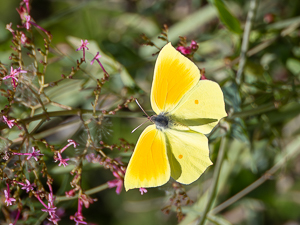

| Family | Pieridae |
|---|---|
| Subfamily | Coliadinae |
| Genus | Gonepteryx |
| Species | cleopatra |
| Authority | (Linnaeus, 1767) |
| English Name | Cleopatra |
| European Red List 2010 | Least Concern (LC) |
|---|---|
| EU 27 Red List 2010 | Least Concern (LC) |
| European Red List 2025 | Least Concern (LC) |
| EU 27 Red List 2025 | Least Concern (LC) |
| Habitats Directive | |
| Bern Convention | |
| CITES |
The Cleopatra is found in light woodland, woodland edges and open bushy places. The males are easily recognized in flight by the orange patches on their forewings; the female looks very much like an ordinary brimstone. They are strong flyers that sometimes roam outside their breeding area. The eggs are laid on the young leaves of various buckthorns, such as Buckthorn (Rhamnus catharticus), Mediterranean Buckthorn (R. alaternus), and Alpine Buckthorn (R. alpinus). The caterpillars feed on the leaves, and pupate on the twigs of the foodplant. The Cleopatra hibernates as an adult butterfly, and therefore can be seen flying for most of the year. Probably, it has only one generation a year.
Albania / Andorra / Bosnia and Herzegovina / Bulgaria (Irregular Vagrant) / Croatia / Cyprus / France / France: Mainland / France: Corsica / Greece / Greece: Mainland / Greece: East Aegean Islands / Greece: Kirti (Crete) / Italy / Italy: Mainland / Italy: Sardinia / Italy: Sicily / Monaco / North Macedonia (Irregular Vagrant) / Malta / Montenegro / Portugal / Portugal: Mainland / San Marino / Slovenia (Irregular Vagrant) / Spain / Spain: Mainland / Spain: Balearic Islands / Spain: Sp. North African Territories / Switzerland (Irregular Vagrant) / European Türkiye / United Kingdom: Jersey (Irregular Vagrant) / United Kingdom: Gibraltar /